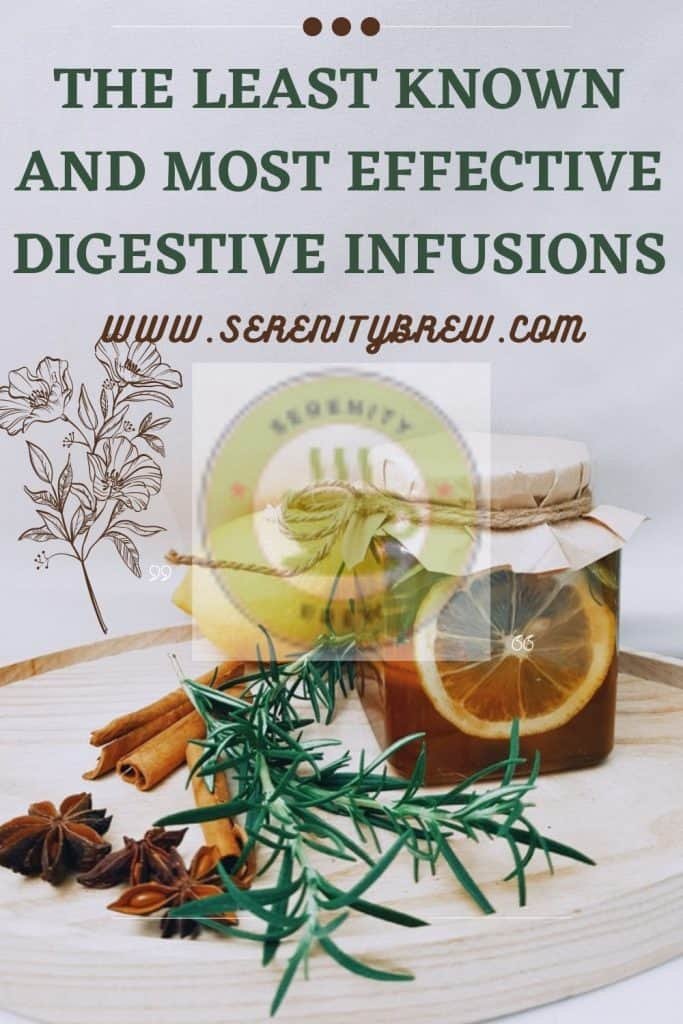
Digestion problems are very common and we often treat them with the same old infusions. If they work for you, great! We are not trying to make you change.
However, the world of infusions is tremendously rich and there are also digestive infusions beyond the typical chamomile, mint and fennel. Today, we want to introduce you to a series of infusions for digestion that you probably don’t know about.
The other digestive infusions

There is nothing more normal than listening to the recommendation to have a cup of an infusion if you have digestive problems to feel better. There are many options: chamomile, mint-pennyroyal, fennel, liquorice, thyme, rosemary… All of them have properties to treat different symptoms such as indigestion, gas or heartburn.
Today, we present other good options, perhaps less known, to improve stomach discomfort and the entire digestive system.
Green Tea
Green tea is famous, mainly, for its positive effects as a supplement in weight loss diets, but also for its polyphenolic components, among which catechins stand out. These have proven antioxidant, anti-inflammatory and antibacterial properties.
For this reason, natural medicine recommends drinking green tea when suffering from different digestive disorders, such as diarrhea. Its catechins are believed to help fight the bacteria that cause the disease. In addition, its anti-inflammatory effect allows to relieve the swelling caused by a large meal and thus prevent the production of gases.
Finally, catechins are absorbed in the intestinal tract, thus preventing gastrointestinal disorders.
Black tea
During the last years, it was recommended to avoid the intake of black tea when we had digestive problems, believing that it could accentuate them. However, the grandmothers who recommended a hot tea in the face of these conditions were right.
Research concluded that black tea has prebiotic effects, that is, it induces the growth of microorganisms necessary for good intestinal health. In this way, drinking black tea favors the recomposition of the microbiota against diarrheal episodes.
Rooibos
The misnamed rooibos tea, because it is made from the leaves of Aspalathus linearis and not those of the tea bush, Camellia sinensis, has properties that make it used as a remedy in South African folk medicine. Among them, antispasmodic properties stand out that calm digestive discomforts such as flatulence, nausea, diarrhea and colic.
Gentian root infusion
Coming from the Gentianaceae family, gentian root has been used for many years as a digestive stimulant to whet the appetite and also to treat all kinds of digestive ailments.
The iridoids of this root, that is, its bitter compounds, would be responsible for increasing the production of digestive acids, thus improving digestion.
Buy this root in bulk at your trusted herbalist and prepare your infusion with 2 grams of it (about 1/2 teaspoon) for every cup of boiling water. Let stand 5 minutes and enjoy.
Angelica root infusion
Angelica root is obtained from a flowering plant in the Apiaceae family. Its earthy-tasting infusion is recommended by traditional medicine to improve digestion as its polysaccharides protect against damage, preventing, for example, ulcers.
In this case, you can make this infusion at home using 14 grams of Angelica root (about a tablespoon) for each cup of boiled water. Then it should rest for 8 minutes. Strain and drink.
Senna infusion
Senna belongs to the Fabaceae family that groups more than 250 species. In this case, we are talking specifically about Senna alexandrina, also called Cassia angustifolia. Its leaves contain sennosides, substances that promote bowel movements, favoring the elimination of waste and preventing constipation.
This infusion is prepared by incorporating 4 grams of dried senna leaves in a cup of boiled water. Let stand 7 minutes and strain before drinking.
Marshmallow root tea
What sounds good? This root comes from the Althaea officinalis plant and is also known as cane grass. Its use is due to its mucilage content, a substance that stimulates the action of cells that secrete gastric protective substances, thus helping to protect the stomach.
On the other hand, by ingesting this infusion you also increase your consumption of antioxidants. In this case, this component decreases the histamine that generates inflammation. Without a doubt, it is a good option to protect against stomach ulcers.
Prepare it by infusing 14 grams of marshmallow root for each cup of boiled water and let it rest for 10 minutes. Strain and drink to benefit from its properties.
As you can see, the world of infusions is incredibly rich and also includes many lesser-known remedies than the traditional chamomiles, mints and pennyroyals. In the blog, we have covered many of them and you can find remedies that can help you improve different digestive complaints, such as nausea, inflammation, constipation, indigestion and diarrhea, among others. Feel free to refer to them for further recommendations.
